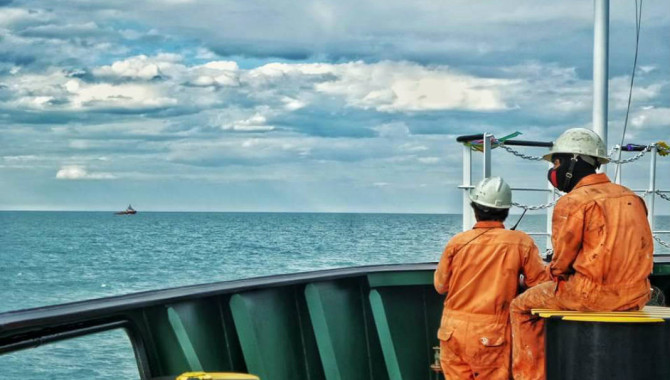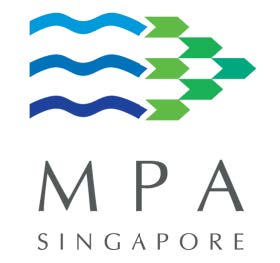
The Seafarers Happiness Index platform from the Mission to Seafarers charity was originally founded in 2015 and is designed to monitor and benchmark seafarer satisfaction.
Mission to Seafarers provides help and support to 1.5 million crewmen and women in over 200 ports around the world.
The index serves as a tool to measure how happy people are about the various elements of their working life. It consists of a standard set of 10 questions and is geared to provide snapshot into the positive and negative issues and experiences of crews around the globe. The aim is to highlight problems within seafaring, delivering opportunities to improve and develop.
Knect365 Maritime decided to investigate the difference that one year can make.
All questions are answered anonymously, and cover mental and physical health, diet, rest, workload, connectivity, training, access to shore leave, as well as relationships at home and onboard. The questions remain the same each quarter. Below we shall examine the differences year-on-year.
For the purpose of this examination, we will be comparing the difference in scores from Quarter 2 of 2018 and Quarter 2 of 2019, doing the comparison question by question.
In the 2018 index, issues such as shipboard inspections, work load, management onboard and ashore, and isolation and loneliness were reported by respondents as having a negative impact on their time at sea. Yet, many still felt “an overwhelming sense of professional pride at working onboard ships.”
The report also claimed that those who shared their view noted they felt “born to do the job”, and overall were happy to be putting their skills and training to practice.
Of the negative responses recorded, loneliness, disconnection and distance from family and friends appeared to have the largest impact on seafarers’ general happiness at sea.
While not a fresh issue, the 2018 index noted “a growing sense of tension between offices ashore and vessels.” The report also highlighted that some seafarers find the shipboard environment less than stimulating. Interestingly, while seafarers were impressed with how new vessels were equipped, they found that the interiors of these vessels were often very sterile. Many believed that the sense of a cosy and friendly space, which encourages interaction with other crew members, was missing. The 2018 index goes on to note; “This could be another reason that seafarers do not feel attracted to leave their cabins as social spaces are not being designed with social interaction in mind.”
While the 2019 index had shown a positive increase (6.21) in the score compared to the Q1 report (6.03), there was a slight decrease (-2%) in the score from 2018 to 2019.
Notably, the 2019 report detailed no positives when compared to the previous year.
Respondents reported their employers focussing on seafarers’ ability to cope with negative aspects of their jobs yet ignored finding solutions to the problems. While no greater detail was provided, the report highlights that seafarers felt frustrated that those working ashore were given more attention than those on vessels.
Respondents also spoke of the impact that smaller crew numbers were having on their life at sea with some questioning whether this was “the single biggest barrier to wellness or happiness onboard.”
How happy are you about the contact you are able to have with your family when you are at sea?
Contact with family, and connectivity in general, is a significant factor for seafarer’s happiness. The 2018 index score (6.87) had dropped from the previous quarter (7.12) as it reported that “certain issues remain.”
While the index once again highlighted the hierarchy at sea between those ships that provide crew with internet access, the comments from seafarers were “more nuanced, with differing levels of services and costs also coming to the fore.” Seafarers were more particular with regards to the levels of acceptable connectivity on a ship.
The 2018 index goes on to note that, “seafarers who experience the satisfaction of being connected are now clamouring for more”. The report highlights a growing sense that seafarers expect their connectivity to mirror the levels which people experience ashore, and this will remain an issue until resolved.
Respondents to the 2018 index also shared strong criticism for companies who charge seafarers for access to connectivity. These seafarers felt that it was “morally and ethically wrong” for companies to make a profit on the communications of their crews.
The 2019 index recorded a marginal increase from the previous year. While the score had increased slightly, it is interesting to note there is a largely positive feedback from respondents as it appears that connectivity seems to have improved.
The index goes on to highlight that seafarers believe that “communication with loved ones is essential, even if it is only for a couple of minutes a day”. Further, it has become clear that “seafarers want to be connected to home, they want access to online services and nothing else will do. ”
With the above in mind, it appears that connectivity, affordability and ease of access will certainly be deciding factors with regards to recruitment and retention in the future.
How happy are you about your access to shore leave?
The 2018 index noted a marginal positive increase from the previous quarter, as seafarers expressed recurring concerns and frustrations.
Restrictions, stringent security and high costs placed on seafarers were recorded as being major negative factors for seafarers. While not the first time it had been reported, the 2018 index goes on to note a culture developing onboard which looks down on seafarers seeking to get ashore. “There were comments in which respondents claimed that masters and senior officers did not condone crew seeking to get ashore.”
The report continues, “Some felt that this was to do with impact on rest hours, while others felt that officers were becoming increasingly embroiled in inspections and audits, and so there was almost a jealousy and resentment which was helping to make shore leave even less attractive.”
The score to this question would experience a steady decline over the next 12 months. By Q2 of 2019 the score would drop by 10% to be the second lowest drop between the 2018 and 2019 indexes.
According to the 2019 index, many seafarers reported that ramped up duties would often make them feel they cannot go ashore, with “so many inspections to be completed, as well as audits, maintenance and all manner of visitors to satisfy, as well as the small matter of cargo work. This means that not only are some senior officers loathe to grant time off, but many seafarers simply feel they cannot be bothered with the hassle.”
Respondents also noted that many terminals are far removed from towns and cities, which makes it “difficult to get from the ship to the gates, and perhaps even more so to actual downtowns.”
How happy are you about your wages/salary?
Three issues stood out prominently in the 2018 report. Namely; pay scales, wage stagnation and fraudulent manning agents.
Respondents believed that “cheaper crews” would undercut their salaries, and many believed this to be a “devastating” problem within the maritime industry. Pay scales were also noted as a recurring issue, with one respondent noting that, “Well the big question, we are all seafarers with international recognized certification, yet the salaries are not equal. Two crew members doing the same job should be entitled to the same salary. While many seafarers syndicate fight for their own, when shall we see a common spirit to fight for better rights?”
Others noted that the issue of pay scales was being cause by Open Registries, with some seafarers believing “Flags of Convenience are killing the industry”, which would harbour the environment for multinational crews on differential pay scales.
Many respondents reported that they had not received a pay rise in years. Some “mentioned five years, others as many as ten years.”
Finally, the 2018 index noted that seafarers reported being taken advantage of by fraudulent manning agents. While not a new issue, some seafarers reported having “paid money for work, only to have their cash and the agent go missing.”
While down from the previous quarter (6.30), the 2019 index reported a score of 6.23 – representing a 2% increase in the happiness of seafarers with regards to their wages/ salary. Similar to the 2018 index, there were three main issues raised in the 2019 index.
While previous indexes had recorded a “begrudging acceptance of wage levels”, the 2019 index notes that a number of respondents communicated in no uncertain terms that “the tough life of a seafarer needs to be better compensated.”
Seafarers also highlighted a continuing trend for wages to be driven down by crews from other nationalities or regions who were willing to accept lower pay.
Finally, the issue of non-payment of wages was raised once more, with many seafarers noting they “experienced delays and faced real frustrations whilst their families suffered.”
How happy about the food on board?
The 2018 index reported that food is an important but sensitive issue as a part of shipboard life as “a means of making them feel happier, satisfied and even to safeguard the bonds between those onboard.”
The major issues highlighted in this report were the lack of input and choice with regards to diet, recipes and the food served with many not happy with the quality. Allegations of cutbacks and cost cuttings are also noted, and while the index does not mention the companies by name, it does highlight that there “were also specific criticisms of some companies.”
The 2019 index notes similar issues of “poor ingredients, bad menu planning and poor-quality cooks.” As crews have become increasingly multi-cultural, there is a clear unhappiness about the cultural sensitivity of “of making the food which means so much to them.”
The index goes on to report that cooks are still taking shortcuts to prepare “quick, unhealthy food”, even where there appear to be adequate ingredients and no nationality issues. Some respondents noted that there are companies who still run a separate mess for crew and officers, “with good food for one and poor quality for the other, thereby stoking resentment.”
How happy are you about your ability to keep fit and healthy on board?
With large and distinctive differences with regards to the function, crew compliments and size of a vessel, we expected to see a variety of responses to this question. However there were some themes which served as a common thread through the index.
The 2018 index highlights the demands of life at sea, stress, lack of consistent patterns and facilities as the main reasons why respondents were not able to exercise.
Some seafarers working on smaller vessels working in trades noted that “numerous port calls and shorter times between cargo operations” meant the crew were in and out of port so often, they didn’t get the opportunity to exercise on shore – given that a smaller vessel would not have the facilities on board. Seafarers on larger vessels (container ships specifically) noted that time spent on the job, working their way across a large vessel and between container stacks was a fair amount of exercise.
Many respondents voiced concern that the companies they worked for required them to maintain a certain Body Mass Index (BMI), however facilities and time were lacking. According to the index, many respondents “stated that they want to stay fit and healthy but require support and assistance in doing so.”
The 2019 index reported a small drop (-4%) in the score from the previous year. Respondents noted very similar issues compared to the previous year, with many noting that ships have minimal or no gym equipment. Where ships do offer facilities, the workloads and schedules of these seafarers is so heavy that “seafarers feel they don’t have the time to use them.”
Interestingly, the 2019 Q2 index notes that they received few responses “from seafarers who have good gym facilities and time to make use of them,” and goes on to note “those who do manage to exercise tend to track higher happiness figures across the board.”
In closing, respondents noted that they were happy that the industry was talking about what seafarers need to do to improve their mental and physical health. However, the 2019 index reported that seafarers “were concerned that the emphasis is on individual crews, rather than on the owners, operators and managers to ensure it.”
How happy are you about the training you receive?
Training appears to be an area which draws responses on opposite aspects of the spectrum for seafarers.
In the 2018 index, many respondents understood the importance of training, but many also questioned the “costs and means of delivery.” Respondents commented on the financial costs of study and additional budgeting pressures, some adding that they didn’t see sufficient value being accorded to training to upskill their abilities and knowledge in relevant areas.
In the 2018 index some seafarers reported that they required more practical support and “training for new systems such as the maintenance of chart updating software was woefully inadequate”. Cybersecurity was another issue which featured across many responses, with seafarers reporting they were under pressure to keep the ship secure, but “felt underprepared as to how they could do so.”
Nevertheless, other respondents noted being very happy with the training, facilities, standard of material and subjects. The index noted that some of these respondents had given praise to some in-house training provided by companies, along with gratitude for “the ease that online or computer-based training can bring.”
While the 2019 index mostly reported only negative responses, there was only a 2% drop in the score as respondents noted similar issues with regards to costs of training and resentment of the amount of personal time which is required to complete training. However two new issues appear to have risen over the course of the year.
Firstly, concerns were raised that training had become a tick box for a company, with one respondent sarcastically stating, “No one on our vessels will die in a confined space. We made them all watch a twenty-year-old video about it. Job done; box ticked.”
Finally, there were frustrations around the “changing perceptions from offices ashore.” The index received claims from seafarers that training is dependent on cost rather than keeping the crew safe and companies tend to invest in training only when the going is good.
How happy are you about interaction with other crew members on board?
Team work is vital to the relationships between crew on a vessel. It helps a crew to form bonds and the interactions and support which seafarers provide to each other is essential.
Some respondents felt that factions can develop, and these can be divisive as vessels accommodate different cultures, languages and religions.
According to the 2018 index, this quarter showed a drop in what had consistently been one of the highest-ranking categories in the index.
However, many respondents “have spoken in positive terms about their fellow shipmates, talking in terms of friendships, professionalism and the levels of support and training that crew and officers alike give each other.”
The 2019 index saw a continued downward trend in the score for this question.
While trends of abrasive office staff are not mentioned, increased tension – even violence and aggression – were reported onboard. “Seafarers spoke of the aggression of senior officers,” the reported highlighted, while “female respondents said they were sexually harassed, assaulted, and had to deal with a general level of disrespect due to gender.”
Interestingly, the 2019 index noted that isolation was a “word that was repeatedly used to capture the sense of how seafarers feel.”
The index reports that some crew felt out of touch and very lonely. The index notes that being “online” did not appear to be the issue, and suggests that with tighter crewing levels, a lack of time and work pressures made it difficult for crew to interact. “The team mentality and approach which has made seafaring a profession of camaraderie, support and even enjoyment has been decimated and eroded.”
How happy are you with your workload?
In review of the answers to the previous questions in the 2018 index, particularly crewing levels, it is hardly surprising to see that the workload and increasing pressures placed on crew – and related issues such as tiredness, stress and fatigue – featured strongly in respondents.
Managers and office workers ashore were also criticised in the index, with respondents reporting that they “felt there was an increasing lack of knowledge and experience… (which) led to an increase in workload, as seafarers were having to guide and assist those ashore.”
Further to this, seafarers reported that their suggestions for improving or evolving safety management systems (SMS) were ignored.
Concerns were also raised by respondents that regulations, documentation and processes were adding additional pressure to life at sea. Many respondents reported that they “spend longer completing the paperwork for a task than the job itself.” The 2019 index goes on to report crew feeling “immense frustration” due to excessive paperwork with a “number of seafarers also [saying] that new technical solutions and the need for paperwork are leading to a duplication of effort.”
A year later, the 2019 index echoed the downward trend from 2018. The index noted “incredible concern” with regards to the spike in workloads and stress, highlighting it as unsustainable. The report goes on to note that “not enough crew onboard to perform all duties, regardless of safe manning certificates” is becoming unsustainable.
Respondents also raised criticism of the hours of rest, claiming the data which is logged is often falsified, noting “time in a log does not always reflect the reality.”
How happy are you with welfare facilities when you are ashore?
It’s important for seafarers to get shore leave, and it is equally important for them that facilities exist for the crew if they get ashore. The 2018 index notes, ” it is increasingly important that when [crewmen come ashore]… they are provided with services, support and experiences which make it worthwhile.”
Positive responses highlighted some “excellent facilities”, and the “difference that good centres” can make. The 2018 Q2 index notes that what seafarers expect is fair prices and good service and goes on to report that the “best facilities” appear to provide “a warm welcome, a place to relax and to talk – as well as good food and drink, sensibly priced goods and free or cheap Wi-Fi.”
Further to this, “centres with additional facilities – particularly access to sports, even as basic as pool or table tennis, were viewed positively by seafarers.”
The 2019 index notes a disappointing falling level of happiness in response to this question but goes on to note that “statistics do not always tell the whole story.” Many of the respondents who scored low on this question expressed frustrations about not getting shore leave. Respondents did note a “mixed standard” of facilities which varied from port to port and nation to nation.
The 2019 index highlights a number of responses giving thanks to centres which have begun to “innovate and provide some forms of access in smaller ports.” From small unmanned satellite centres or hubs, seafarers were thankful for a degree of comfort and respite.
The report closes by highlighting a number of requests for “improved internet access in centres and the facilities to make calls or to communicate quietly, privately and in comfort.”
While there are several issues raised in the Index over the last year, it’s important to highlight the frustration seafarers feel in three growing areas of concern. – wages, shore leave, and work load issues.
From delayed payments to wage stagnation, the downward trend of perception of wages and pay from seafarers is not good for the maritime industry.
It is really worrying that seafarers feel the concept of time off is being eroded, and crews are finding it harder to be able to leave their vessel. The industry is running a risk that seafarers will soon see the costs of being on-board outweighing the benefits.
Finally, the concerns raised about workload ought to be heeded. The impact of workload on productivity and happiness is well documented and can have a direct effect on crew morale, cohesion, health and safety. Heavy workloads can also lead to poor communication, conflict and errors.
Source:Knect365
The opinions expressed herein are the author's and not necessarily those of The Xinde Marine News.
Please Contact Us at:
admin@xindemarine.com


 Baltic Exchange launches new Fuel Equivalence Conve
Baltic Exchange launches new Fuel Equivalence Conve  21 Consecutive Years of QUALSHIP 21 Recognition for
21 Consecutive Years of QUALSHIP 21 Recognition for  MPA and Wärtsilä Renew Partnership to Drive Marit
MPA and Wärtsilä Renew Partnership to Drive Marit  MPA and Dalian Maritime University Renew Partnershi
MPA and Dalian Maritime University Renew Partnershi  PSA INTERNATIONAL, DNV AND PACIFIC INTERNATIONAL LI
PSA INTERNATIONAL, DNV AND PACIFIC INTERNATIONAL LI  INTERCARGO Reaffirms Call for Simplicity as IMO Cli
INTERCARGO Reaffirms Call for Simplicity as IMO Cli